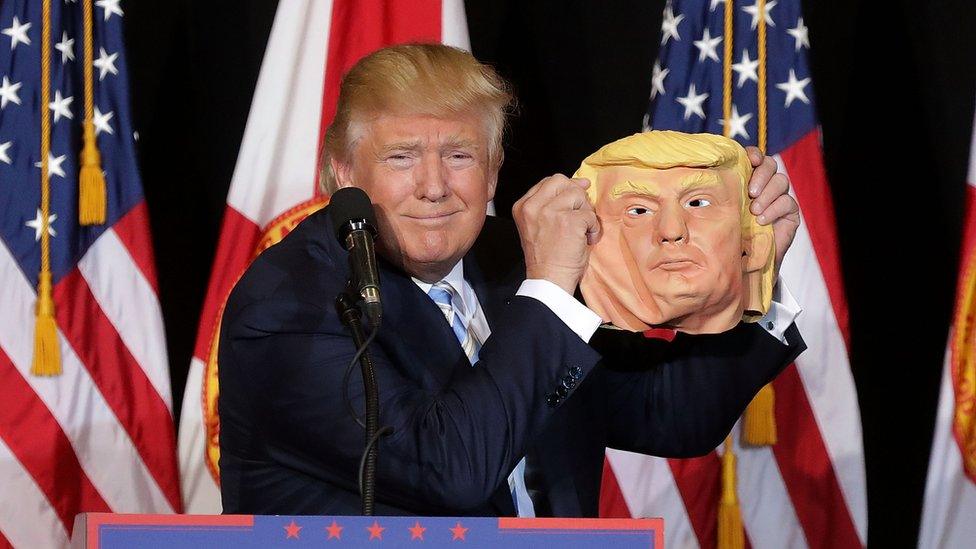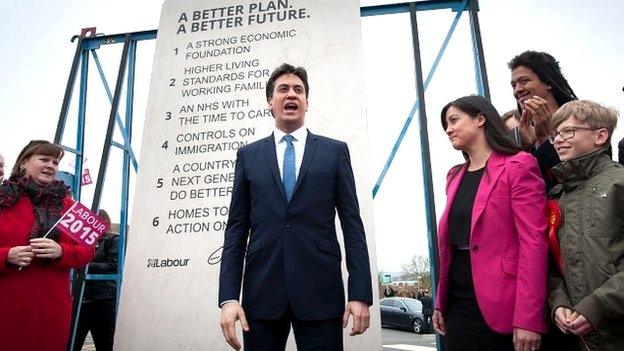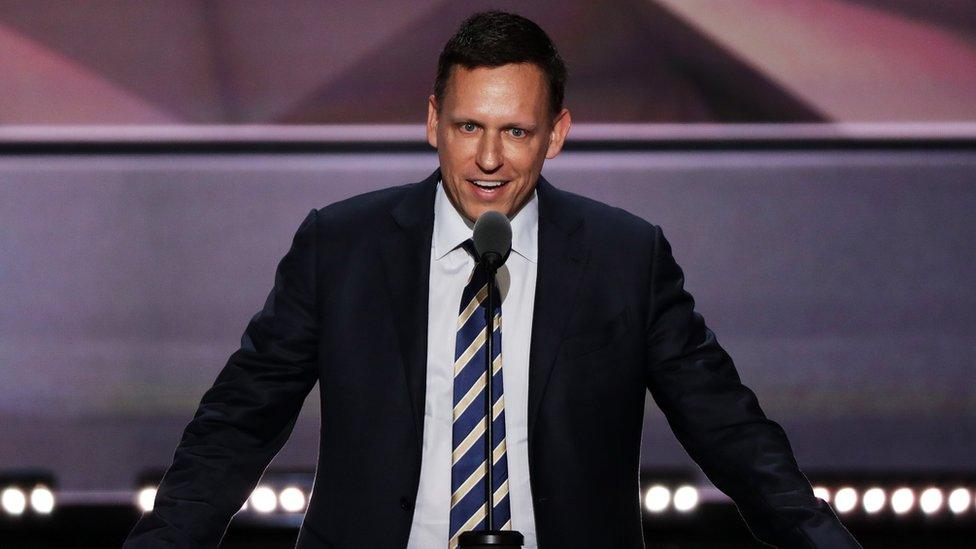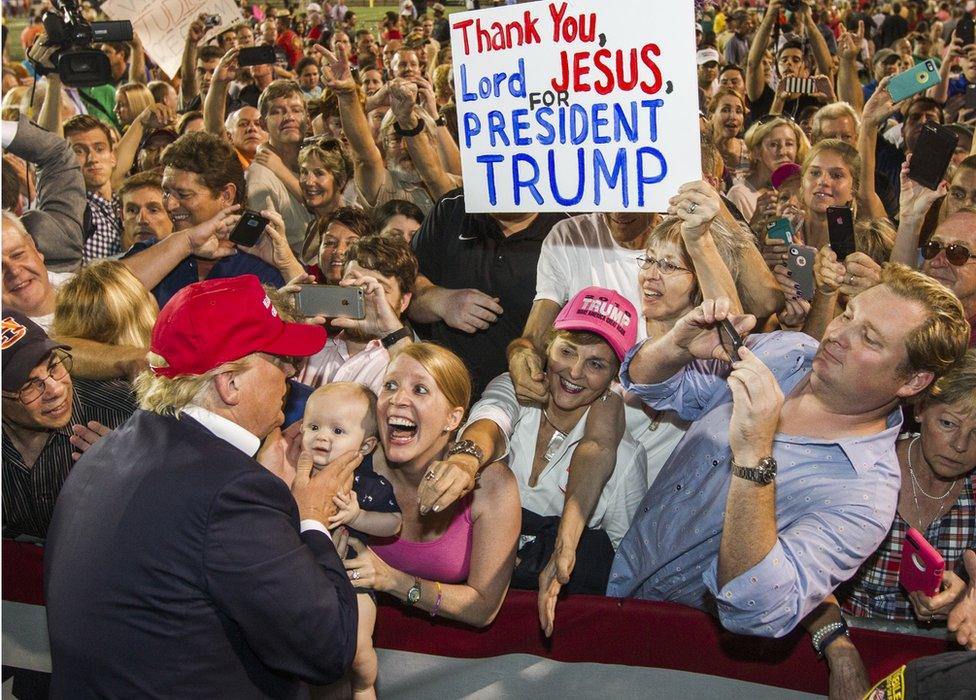Donald Trump, the Snapchat president?
- Published

The imminent Trump presidency throws up a hundred column ideas a day. So I feel I'm not done here yet. But one of the questions I keep returning to is this: Will he do what he said he would do? And is that a good thing or a bad thing?
It is, it's fair to say, an unusual predicament to be in as a journalist. Normally, holding our elected officials to account means ensuring they stick to their pledges.
That's why we have manifestos. We make them write things down.
Occasionally the written word just isn't enough. In the not too far distant past, lived a man named Ed Miliband who thought it so essential to be believed that he committed his promises to rock, and like Moses - or should I perhaps say God - had them hewn in a stone so hefty it could not appear before assembled crowds without provoking a communal convulsion of laughter.

This time round we may have Mr Snapchat himself. There is a clear statement of intent ("lock her up", "build a wall") - a defined image - and then it sort of disappears before your eyes. He may be something of a builder in his business dealings, but he is less keen on the use of stone as a metaphor for promises in which to set things.
And the question for me - for us - the journalists/liberal elite/people who "don't get it" is this: Is our job now to hold to account a president who might have been peddling abrasive, divisive policies to get himself elected? Policies he himself may have no real intention of enacting?
When I have asked this question recently to Trump Supporters On Telly (TSOT), they have all, to a person, thrown one name back at me - Peter Thiel. Why? Because he gave Trump - and his surrogates - a linguistic get out clause. And they're exploiting it to the full.
Thiel, you might remember, is a Trump backer - openly gay, pragmatic - with a central role in bringing the Gawker website to its financial knees. He's now on Trump's transition team. It was his speech to the National Press Club they quote now:
"The media has always taken Trump literally. It never takes him seriously, but it always takes him literally... Voters who vote for Trump take Trump seriously but not literally."

When you stop and think about it for a second, it's genius. It means, in essence, you have to define "nuance" in what Trump says. Now there's a thought.
Ann Coulter bent my ear the night before the election: "When Trump says millions of Muslims celebrated in America on 9/11 he doesn't literally mean millions but he does mean lots."
"Is that ok?" I asked. Her point is that Trump tries to make his point with what we might kindly call truthful exaggeration. His whole life's work has been predicated on this.
A few years ago when I interviewed him for a documentary, external, he told me his was the biggest ballroom in New York. We looked it up. It isn't. It seemed an odd thing to base a character assassination on. So we moved on. But now I think about it, the seeds were there.
As they are in the numbering of his buildings. Trump Towers has 58 floors. Yet the top floors - his penthouse - are numbered 66-68. It's his building. He can number them in any order he wants, I suppose. He could do the whole thing in binary and it would only be faintly eccentric.
My point is this: when someone fudges the little things, no-one is quite sure how to read the big things. What if it wasn't a million Muslims celebrating. What if it was seven. Does anyone in his crowd care? Probably not. What if he wants to build a wall and do some of it using a fence? Does anyone in his crowd care? Probably not.

Yesterday we heard Obama confirm Trump told him personally he would maintain a strong commitment to Nato. That's the Nato Trump described as obsolete during the campaign. The one whose basic premise of mutual defence he has threatened to ignore.
So if Trump rows back on everything he previously said, should we quietly suck it up and make no trouble? After all, if his voters are so much better than us at working out the difference between "the serious and the literal" maybe it shouldn't matter?
The biggest problem with the Snapchat policy president might come, I'd guess, from the Republican Party itself. I heard his opponents on the primary campaign trail - the ideas coming from Ted Cruz and Marco Rubio were far more radical and right than many of those Trump uttered. The Republicans hold all the power now. They can do whatever they choose for two years at least.
Funny - that may end up being Trump's biggest problem of all.
Emily Maitlis presented BBC Newsnight's coverage of the US presidential election. You can follow her on Twitter, external, watch more of her reports, external, or read more from her on her blog.